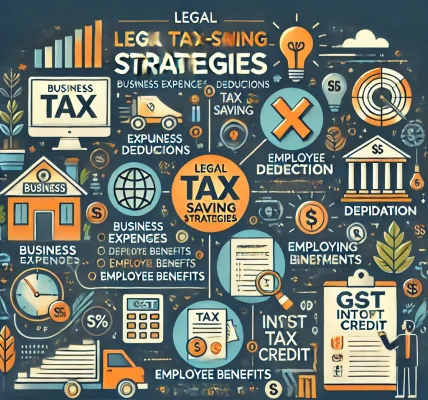Introduction
As senior citizens, managing finances wisely is crucial, especially when it comes to tax planning. The Income Tax Act of India provides several tax benefits for individuals aged 60 years and above. Proper tax planning can help senior citizens reduce their taxable income and maximize savings while ensuring full compliance with legal provisions.
This guide provides a comprehensive overview of the best tax-saving options for senior citizens in 2025, helping them take advantage of available deductions, exemptions, and investment avenues.
1. Understanding the Tax Slabs for Senior Citizens in 2025
The income tax slabs for senior citizens (60-80 years) and super senior citizens (80+ years) differ from regular taxpayers, offering higher exemptions.
A. Tax Slabs for Senior Citizens (60-80 years)
| Income Slab | Tax Rate (Old Regime) | Tax Rate (New Regime) |
|---|---|---|
| Up to ₹3,00,000 | Nil | Nil |
| ₹3,00,001 – ₹5,00,000 | 5% | 5% |
| ₹5,00,001 – ₹10,00,000 | 20% | 10% |
| Above ₹10,00,000 | 30% | 30% |
B. Tax Slabs for Super Senior Citizens (80+ years)
| Income Slab | Tax Rate (Old Regime) | Tax Rate (New Regime) |
| Up to ₹5,00,000 | Nil | Nil |
| ₹5,00,001 – ₹10,00,000 | 20% | 10% |
| Above ₹10,00,000 | 30% | 30% |
2. Best Tax-Saving Options for Senior Citizens
A. Higher Exemption Limit
- Senior citizens get a basic exemption limit of ₹3 lakh instead of ₹2.5 lakh.
- Super senior citizens (80+ years) have a ₹5 lakh exemption limit.
- No tax payable if total income is up to ₹5 lakh, thanks to Section 87A rebate.
B. Deduction on Interest Income (Section 80TTB)
- Senior citizens can claim a deduction of up to ₹50,000 on interest earned from bank savings accounts, fixed deposits (FDs), and post office deposits.
- This deduction is exclusive to senior citizens and cannot be claimed by younger taxpayers.
C. Medical Insurance & Treatment Benefits (Section 80D & 80DDB)
- 80D: Deduction of up to ₹50,000 on health insurance premiums paid.
- 80DDB: Deduction of up to ₹1 lakh for treatment of specified critical illnesses.
- Senior citizens who do not have health insurance can still claim ₹50,000 deduction on medical expenses.
D. Exemption on Reverse Mortgage Loan
- Senior citizens can reverse mortgage their home to get a monthly payout, which is not taxable.
- This allows them to generate tax-free income while continuing to live in their home.
E. No TDS on Interest Income (Form 15H)
- Senior citizens can submit Form 15H to their bank to ensure that TDS is not deducted on FD interest if total income is below the taxable limit.
F. Senior Citizens’ Savings Scheme (SCSS)
- A government-backed savings scheme with an interest rate of ~8%.
- Interest earned is taxable, but the principal investment is eligible for a ₹1.5 lakh deduction under Section 80C.
G. Public Provident Fund (PPF) and National Pension System (NPS)
- PPF: A long-term tax-saving option with exempt-exempt-exempt (EEE) status.
- NPS: Senior citizens can claim up to ₹50,000 deduction under Section 80CCD(1B) in addition to ₹1.5 lakh under 80C.
H. Tax-Free Bonds & Post Office Schemes
- Tax-Free Bonds: Government-issued bonds offering tax-free interest.
- Post Office Monthly Income Scheme (POMIS): Provides guaranteed monthly income, though interest is taxable.
3. Comparison of Tax-Saving Investment Options
| Investment Option | Interest Rate | Taxability | Maximum Deduction |
| SCSS | ~8% | Taxable | ₹1.5 lakh under 80C |
| PPF | ~7.1% | Tax-Free | ₹1.5 lakh under 80C |
| Tax-Free Bonds | ~6% | Tax-Free | No limit |
| NPS | ~9-10% | Partially taxable | ₹2 lakh under 80C & 80CCD(1B) |
| FDs | ~6-7% | Taxable | ₹50,000 under 80TTB |
4. Tax Planning Tips for Senior Citizens
A. Opt for the Right Tax Regime
- The old tax regime is usually better for senior citizens due to higher deductions.
- The new tax regime is beneficial if total income is above ₹15 lakh.
B. Avoid Clubbing of Income
- Income from gifts or interest on joint accounts with family members can increase taxable income.
- Consider separate investments for tax efficiency.
C. Utilize Section 87A Rebate
- If total income does not exceed ₹5 lakh, no tax is payable due to a ₹12,500 rebate under Section 87A.
D. Invest in Joint Names for Better Tax Planning
- Senior citizens can invest in joint names with their spouse to reduce tax liability and distribute interest income.
E. Plan Withdrawals from Retirement Funds Wisely
- Withdraw EPF or pension income strategically to stay in lower tax brackets.
Conclusion
Senior citizens have multiple tax-saving options that help them reduce their taxable income and maximize savings. By utilizing deductions under Sections 80C, 80D, 80TTB, and 80DDB, along with tax-efficient investment options, they can enjoy a financially secure retirement.
It is always advisable to consult a tax expert or chartered accountant for personalized tax planning, ensuring full compliance with Indian tax laws.



